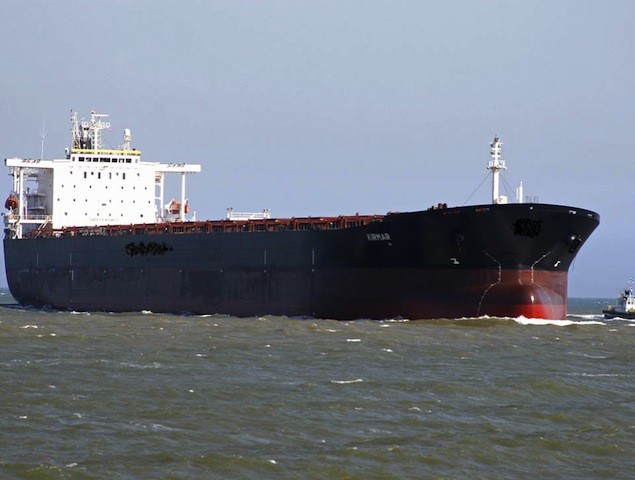Trump Tariffs on Russia’s Oil Buyers Bring Economic, Political Risks
From punishing Brazil to trying to curb imports of fentanyl, U.S. President Donald Trump has wielded the threat of tariffs as an all-purpose foreign policy weapon.

Excel Maritime’s capesize bulker, MV Kirmar. Image courtesy Excel Maritime
Troubled Athens-based shipping company Excel Maritime (EXM) revealed in yesterday’s press release one of industry’s worst kept secrets: The company is insolvent. In a 255 page-long report filed with the SEC, outlining a proposed pre-packaged bankruptcy reorganization plan, Excel Maritime admitted that there is so little value left in the company, even senior debt holders can hope to recover only about 77% of their $771 million debt outstanding.
Holders of the company’s $163 million convertible notes will be less fortunate, holding the bag for about two cents on the dollar. As for common shareholders whose name does not rhyme with Panayotides, Excel Maritime’s Chairman, forget about them. They stand to get nothing, nada, zilch, τιποτα. In a matter-of-fact summary of the treatment of various claims against the company in a bankruptcy reorganization, EXM disclosed in its own words that “any equity security in Excel, including but not limited to stock, warrants and options, will be cancelled”, and holders of such securities “will not retain any property or receive any recovery under the plan”.
The company’s woes should come as no surprise to investors. EXM had officially disclosed its restructuring efforts with its senior lenders back in March. The company has yet to publish its audited financial statements for year 2012. It had also received a notice of non-compliance from the NYSE and got its wish yesterday when trading of its shares on the Big Board were suspended, with a delisting from the exchange coming next. It makes you wonder what penny-stock buyers were thinking bidding its shares during the last couple of months.
As I begin scouring the lengthy report I would like to share some initials thoughts about EXM, that may also relate to two other troubled shipping companies, Eagle Bulk Shipping (EGLE), and Genco Shipping & Trading (GNK), that are teetering on the brink of insolvency.
Big fleet acquisitions can lead to big headaches. Excel Maritime consummated an aggressive takeover of Quintana Maritime back in April 2008. It transformed itself overnight from a ho-hum owner to one of the largest dry bulk shipping companies in the industry. It increased its fleet size from 18 vessels to 47 vessels plus an additional 8 new-buildings.
“Our business strategy includes expansion of operations and client base. We aim to become one of the world’s premier full service dry bulk shipping companies. The acquisition of Quintana was an important step towards achieving this goal. Following the merger, we now operate a fleet of 47 vessels with a total carrying capacity of 3.9 million dwt and a current average age of approximately 8.8 years, which makes us one of the largest dry bulk shipping companies in the industry and gives us the largest dry bulk fleet by dwt operated by any U.S.-listed company”. (Source: EXM 2008 Annual Report)
Eagle Bulk Shipping had pulled a similar stunt a few months earlier, when it paid Kyrini $150 million just to acquire previously signed contracts for 26 new-building vessels. Genco, a company created as the result of a fleet acquisition in 2005, went all-in in 2010 when it acquired a total of 18 vessels from Metrostar and Bourbon.
Was the industry consolidated because of these three big acquisitions? Were the companies able to earn an above market rate because they controlled more vessels? Were they able to achieve economies of scale? I am afraid the answer to all these questions is no. Despite what corporate executives and investment bankers want us to believe, growth by itself seldom works well in the shipping industry.
A rising tide cannot lift a sunken boat. There has recently been renewed optimism among investors in publicly traded shipping companies. Catch phrases like cyclical recovery, freight market reversion to the mean, etc have created the impression that a return to profitability is just around the corner. Investors argue that stock prices are forward-looking mechanisms and should reflect this eventual recovery. It is true that when markets eventually recover shareholders will benefit, assuming they are still around.
The problem is many companies are heavily indebted and have no value left for shareholders. They would have to restructure their balance sheets long before the industry recovery. In most cases, witness the proposed EXM restructuring deal, this means wiping out the hoi polloi.
Not all shareholders are created equal. At the darkest hour, when most common shareholders of EXM are about to get wiped out, company insider & majority shareholder Gabriel Panayotides lives to see another day. He gets to apply $20 million of funds already committed to the company, plus an additional $10 million, to acquire 60% of the new equity. He gets an option, should things go well over the next two years, to raise its equity stake to 75% for an additional $20 million. During this initial two-year period, he will also keep control of the company by having the right to appoint a majority of board members. Now here is a fine example of value creation that unfortunately is unavailable to the rest of us.
I like to be as optimistic as the next ship-owner and I believe that the supply overhang will not stay with us forever. But I also like to be realistic that many companies have dug themselves so deep into the hole, there will be nothing left for their shareholders when the recovery comes. Unless you are a related party it is not worth looking at these companies as sound investments.

Sign up for gCaptain’s newsletter and never miss an update

Subscribe to gCaptain Daily and stay informed with the latest global maritime and offshore news
Essential news coupled with the finest maritime content sourced from across the globe.
Sign Up